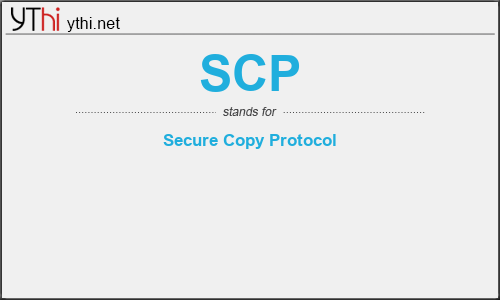What does SCP mean? What is the full form of SCP?
The full form of SCP is Secure Copy Protocol.
Secure Copy Protocol (SCP), often referred to as Secure Copy, is a protocol for computer networks that ensures the secure transfer of data between a local host and a remote host or alternatively between two remote hosts. It is based on the RCP commands (remote copy) published as part of the Berkeley r-commands by the University of California, Berkeley back in 1982. These allow you to manage data transfer using command lines.
SCP provides an authentication procedure between the two hosts as well as encryption for the transfer. In this way, the protocol ensures both the security and the authenticity of the transferred data. SCP protocol uses SSH (Secure Shell) for both of these security measures. SSH is also used by other transfer protocols such as FTP (or SFTP). The TCP port used for SCP transfer is SSH standard port 22.
Secure Copy is cross-platform. There are versions and programs for all standard Windows, macOS, and Linux operating systems as well as for Android and iOS.
Does your business rely on the Secure Copy Protocol (SCP) to enable remote users to exchange files with each other and with customers and business partners? If so, it might be time to consider another approach!
In 2019, ZDNet identified the Secure Copy Protocol (SCP) as one of the “scariest hacks and vulnerabilities” of the year. All SCP implementations since 1983 were found to be vulnerable to four security bugs.
The news came as a bit of a shock for those who thought SCP provides a secure method for transferring files. That’s understandable given that the protocol contains the SecureShell (SSH) protocol, which uses cryptography algorithms such as the Advanced Encryption Standard (AES) and the Standard Hashing Algorithms (SHA-2) on communications between servers and remote clients. SSH also authenticates users by transferring inputs from clients to hosts, and by relaying authentication keys back to clients.
Because SCP works on Windows, Linux, UNIX, and Mac devices and provides native commands to the operating systems, it gained popularity over the past four decades. At least up until the ZDNet report, SCP was believed to be secure, running on Port 22 and transferring confidential data while blocking packet sniffers that can extract the data packets. SCP also included permissions and timestamps for transferred files.
SCP
means
Secure Copy Protocol![]()
Translate Secure Copy Protocol to other language.


Leave a Reply
You must be logged in to post a comment.